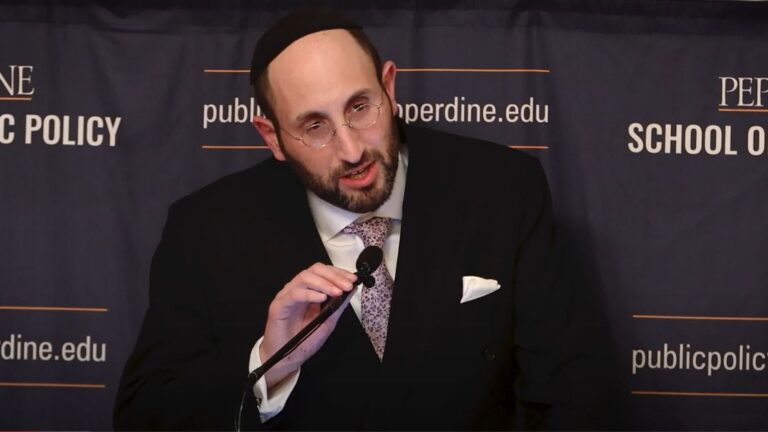The great religions, Christianity and Islam, along with the great political and intellectual movements of modernity, from liberalism to democracy to modern science, all share an aspiration to speak equally to every person on earth. They understand themselves as universal. But Judaism is different. God’s covenantal relationship with the Jewish people was born in His love for Abraham and his descendants, whom He delivered from Egypt and made into a nation in the wilderness of Sinai. Judaism is thus particular, not universal, and its particularity is bound up with a national home in the Land of Israel, and its ancestral capital, Jerusalem. But in its very particularity, the Jewish people also have a universal significance that inspires other nations, and women and men of other faiths. In this speech, Rabbi Soloveichik asks why countless non-Jews around the world are so profoundly moved by the reunification of Jerusalem, and the U.S. decision to relocate its embassy there, while exploring the universal significance of Jewish Jerusalem.
This lecture was given at the 2021 Jewish Leadership Conference.
Explore More

What Jews Mean to America, with Rabbi Meir Soloveichik and Jay Nordlinger
Rabbi Soloveichik sits down with NR senior editor Jay Nordlinger to discuss his tentpole essay, "What Jews Mean to America."

On Making Men Moral, 30 Years Later, and Professor Robert George
Rabbi Soloveichik discusses an essential but forgotten work, and the influence of one of his greatest teachers.
The great religions, Christianity and Islam, along with the great political and intellectual movements of modernity, from liberalism to democracy to modern science, all share an aspiration to speak equally to every person on earth. They understand themselves as universal. But Judaism is different. God’s covenantal relationship with the Jewish people was born in His love for Abraham and his descendants, whom He delivered from Egypt and made into a nation in the wilderness of Sinai. Judaism is thus particular, not universal, and its particularity is bound up with a national home in the Land of Israel, and its ancestral capital, Jerusalem. But in its very particularity, the Jewish people also have a universal significance that inspires other nations, and women and men of other faiths. In this speech, Rabbi Soloveichik asks why countless non-Jews around the world are so profoundly moved by the reunification of Jerusalem, and the U.S. decision to relocate its embassy there, while exploring the universal significance of Jewish Jerusalem.
This lecture was given at the 2021 Jewish Leadership Conference.
Explore More

What Jews Mean to America, with Rabbi Meir Soloveichik and Jay Nordlinger
Rabbi Soloveichik sits down with NR senior editor Jay Nordlinger to discuss his tentpole essay, "What Jews Mean to America."

On Making Men Moral, 30 Years Later, and Professor Robert George
Rabbi Soloveichik discusses an essential but forgotten work, and the influence of one of his greatest teachers.
The great religions, Christianity and Islam, along with the great political and intellectual movements of modernity, from liberalism to democracy to modern science, all share an aspiration to speak equally to every person on earth. They understand themselves as universal. But Judaism is different. God’s covenantal relationship with the Jewish people was born in His love for Abraham and his descendants, whom He delivered from Egypt and made into a nation in the wilderness of Sinai. Judaism is thus particular, not universal, and its particularity is bound up with a national home in the Land of Israel, and its ancestral capital, Jerusalem. But in its very particularity, the Jewish people also have a universal significance that inspires other nations, and women and men of other faiths. In this speech, Rabbi Soloveichik asks why countless non-Jews around the world are so profoundly moved by the reunification of Jerusalem, and the U.S. decision to relocate its embassy there, while exploring the universal significance of Jewish Jerusalem.
This lecture was given at the 2021 Jewish Leadership Conference.
Explore More

What Jews Mean to America, with Rabbi Meir Soloveichik and Jay Nordlinger
Rabbi Soloveichik sits down with NR senior editor Jay Nordlinger to discuss his tentpole essay, "What Jews Mean to America."

On Making Men Moral, 30 Years Later, and Professor Robert George
Rabbi Soloveichik discusses an essential but forgotten work, and the influence of one of his greatest teachers.

